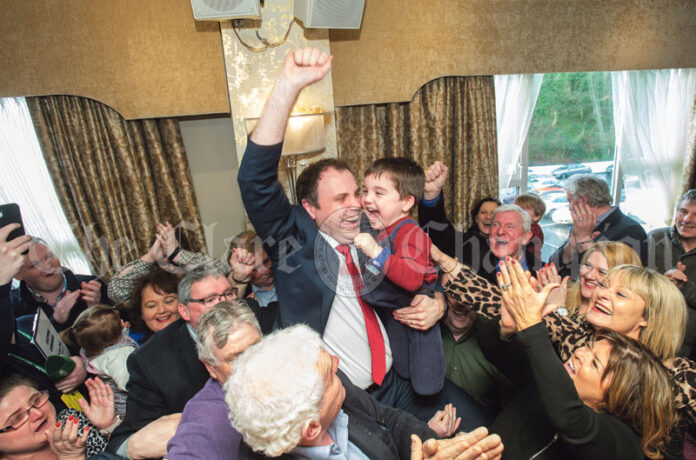IT would be something of an understatement to say that a lot has happened in the months since Monday, February 10. It snowed in North Clare on the day that Cathal Crowe was unveiled as a new TD, after a General Election count fraught with drama. And while many thought hell would freeze over before Fianna Fáil and Fine Gael would coalesce, and join with the Greens in a history-making new administration, that is what has transpired, against the backdrop of a global pandemic.
Ten days later Deputy Crowe took his seat in the Dáil, and received the keys to his new office on the third floor of the Leinster House 2000 building. Since then, he has been putting in gruelling 14-16 hour days and, after the protracted process of government formation, he believes he has found his stride as a national representative. “As a first-time TD, you’re on a very steep learning curve,” he said. “It’s like Fresher’s Week in college. It’s all new and reminds me of starting out on Clare County Council in 2004.”
The torturous four months of government formation efforts left the first-time TD chomping at the bit. The coalition, he admitted, was not an arrangement he would have welcomed in the heady days just after he secured a Dáil seat. “Back in February, I wouldn’t have foreseen or indeed wanted this coalition,” he said. “With the pandemic, I could see the worry people were experiencing. We are still in a period of crisis and everyone has had to reassess. By the time we got to the end of March, I was fully behind the coalition and started speaking to Micheál Martin about what I would like to see in the Programme for Government, in terms of the rural economy, aviation, the protection of rural post offices and issues like that, and I would like to think those things have been included.
“The other thing is that I have always worked, in politics, in a spirit of cooperation. On Clare County Council, I saw the value of power sharing. National politics isn’t as collegial, but it has been great to see cross-party support for issues including Shannon Airport and Shannon Heritage.”
In relation to the difference of opinion among grass-roots members, in this constituency and others, on the merits of leaving Civil War divisions aside, Deputy Crowe said it is important now to move forward: “I think any differences are very minor. Fianna Fáil is my party. I don’t believe there should be cliques or enclaves. I wear the Clare jersey with the Fianna Fáil vest underneath, but I want to be absolutely clear that I am a TD for the whole county.”
In terms of raising priority issues for the constituency, Deputy Crowe said that recent weeks have seen him come into his own. “I feel a lot more hopeful and excited now than I did back in March,” he admitted. “That process of getting a government formed was very frustrating, particularly as I had very little speaking time. Now, I can speak and present cases on behalf of constituents and that has re-energised me. I now have the chance to make a real difference.”
Deputy Crowe identified his main focus as being on county-wide topics and the cases of individual constituents.
“I have made Shannon Airport my calling card in Dublin,” he said. “I have raised it at every opportunity, with Shannon Heritage as a spin off from that. Shannon Airport is absolutely pivotal to this region and crucial to unlocking the potential of the Midwest as a place where young people can live and work and raise families. I have also consistently raised the issue of Clare Bus and have advocated successfully on behalf of individual constituents in relation to health and other matters.”
As the Dáil goes into recess this week, Deputy Crowe said there is “acute urgency” around the future of Shannon Heritage. “Those sites which have opened are going to close again at the end of August unless action is taken,” he noted. “We also need a lot more certainty for the aviation sector in terms of the Green List.”
Making sure the July Stimulus works for small business and providing more rural areas with sewage schemes are other areas where Deputy Crowe would like to see immediate action. He also believes that one of the most pressing local and national issues is the re-opening schools: “We really need the plan to be robust and I hope it will prove to be.”
Much has been made of early controversies for the government, including the Barry Cowen debacle. Deputy Crowe said that while he feels very sorry for the former agriculture minister, he has no issue with the Taoiseach’s handling of the matter. “What Barry Cowen did was absolutely and fundamentally wrong,” he said. “Drinking and driving cannot be condoned. He was caught and punished and his first accountability was to the Gardaí and then politically. He paid a massive price politically. I respect the Taoiseach’s decision and we have to move on now from squabbles and bickering.”
What is of more concern to the Meelick man is the recent incidents of mixed messaging, and public differences of opinion between the Taoiseach and the Tanáiste on items like the travel Green List and the cut to the VAT rate in the July Stimulus.
“In terms of messaging, it was disappointing to see some of Leo Varadkar’s activity on-line,” Deputy Crowe said. “The three parties have a collective responsibility and that is multiplied for a minister and someone in the position of Tánaiste. Arguments at cabinet can be healthy, but differences of opinion should begin and end at the cabinet table. We’re all in this together.”

